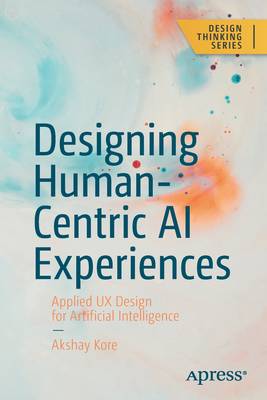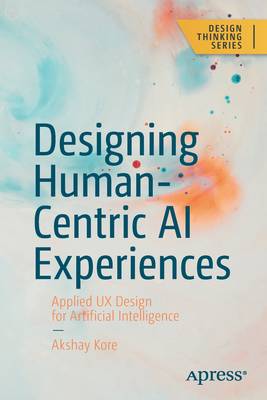
- Retrait gratuit dans votre magasin Club
- 7.000.000 titres dans notre catalogue
- Payer en toute sécurité
- Toujours un magasin près de chez vous
- Retrait gratuit dans votre magasin Club
- 7.000.000 titres dans notre catalogue
- Payer en toute sécurité
- Toujours un magasin près de chez vous
90,95 €
+ 181 points
Format
Description
User experience (UX) design practices have seen a fundamental shift as more and more software products incorporate machine learning (ML) components and artificial intelligence (AI) algorithms at their core. This book will probe into UX design's role in making technologies inclusive and enabling user collaboration with AI.
AI/ML-based systems have changed the way of traditional UX design. Instead of programming a method to do a specific action, creators of these systems provide data and nurture them to curate outcomes based on inputs. These systems are dynamic and while AI systems change over time, their user experience, in many cases, does not adapt to this dynamic nature.
Applied UX Design for Artificial Intelligence will explore this problem, addressing the challenges and opportunities in UX design for AI/ML systems, look at best practices for designers, managers, and product creators and showcase how individuals from a non-technical background can collaborate effectively with AI and Machine learning teams.
You Will Learn:
AI/ML-based systems have changed the way of traditional UX design. Instead of programming a method to do a specific action, creators of these systems provide data and nurture them to curate outcomes based on inputs. These systems are dynamic and while AI systems change over time, their user experience, in many cases, does not adapt to this dynamic nature.
Applied UX Design for Artificial Intelligence will explore this problem, addressing the challenges and opportunities in UX design for AI/ML systems, look at best practices for designers, managers, and product creators and showcase how individuals from a non-technical background can collaborate effectively with AI and Machine learning teams.
You Will Learn:
- Best practices in UX design when building human-centric AI products or features
- Ability to spot opportunities for applying AI in their organizations
- Advantages and limitations of AI when building software products
- Ability to collaborate and communicate effectively with AI/ML tech teams - UX design for different modalities (voice, speech, text, etc.)
- Designing ethical AI system
Spécifications
Parties prenantes
- Auteur(s) :
- Editeur:
Contenu
- Nombre de pages :
- 468
- Langue:
- Anglais
- Collection :
Caractéristiques
- EAN:
- 9781484280874
- Date de parution :
- 13-08-22
- Format:
- Livre broché
- Format numérique:
- Trade paperback (VS)
- Dimensions :
- 156 mm x 234 mm
- Poids :
- 684 g







